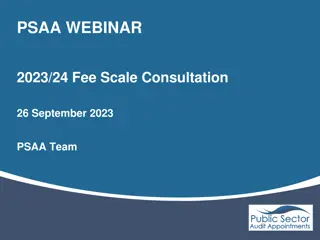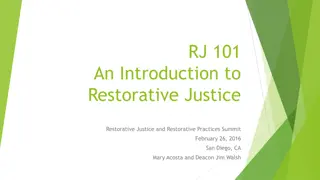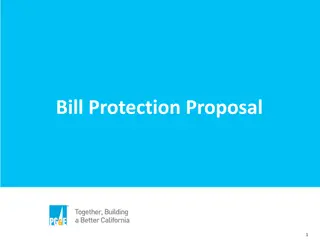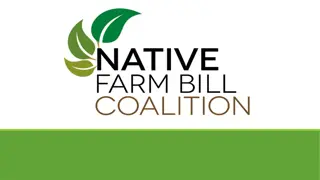Child Justice Bill 2021 Public Consultation Overview
The Child Justice Bill 2021 Public Consultation provides an opportunity for community engagement to ensure consistency and appropriateness in dealing with child offenders. It aims to establish a clear system for child justice, aligning with international obligations such as the United Nations Convention on the Rights of the Child. The consultation covers key aspects like the purpose, scope, criminal justice committee, assessment, diversion, and sentencing. This bill focuses on protecting children's rights, preventing repeat offenses, and promoting a safer community in Montserrat.
Download Presentation

Please find below an Image/Link to download the presentation.
The content on the website is provided AS IS for your information and personal use only. It may not be sold, licensed, or shared on other websites without obtaining consent from the author.If you encounter any issues during the download, it is possible that the publisher has removed the file from their server.
You are allowed to download the files provided on this website for personal or commercial use, subject to the condition that they are used lawfully. All files are the property of their respective owners.
The content on the website is provided AS IS for your information and personal use only. It may not be sold, licensed, or shared on other websites without obtaining consent from the author.
E N D
Presentation Transcript
CHILD JUSTICE BILL 2021 PUBLIC CONSULTATION
AGENDA 1. Welcome and introductions 2. What we want to achieve 3. Purpose and scope 4. Criminal Justice Committee 5. Assessment 6. Diversion 7. Sentencing
PURPOSE OF PUBLIC CONSULTATION WHAT WE WANT TO ACHIEVE Provides GOM with information not otherwise available to them It enables people to participate in decision making and have a sense of ownership of the Bill Good way to assess the impact of a Bill on the community that it will effect and identify any unintended effects Remember! Nothing is yet entered into law and so we can still make changes according to your views
CRIMINAL JUSTICE ACT 2021 WHAT IS IT ABOUT? AN ACT TO ESTABLISH A JUDICIAL PROCESS FOR CHILDREN ACCUSED OF COMMITTING OFFENCES, UNDERPINNED BY RESTORATIVE JUSTICE APPROACHES AND WHICH AIMS AT PROTECTING THE RIGHTS OF CHILDREN; TO PROVIDE FOR THE MINIMUM AGE OF CRIMINAL CAPACITY OF CHILDREN; TO INSTITUTE DIVERSION OF CASES AWAY FROM FORMAL COURT PROCEDURES; TO ESTABLISH THE ASSESSMENT OF CHILDREN AND INITIAL INQUIRIES AS COMPULSORY PROCEDURES; TO EXTEND THE SENTENCING OPTIONS AVAILABLE IN RESPECT OF CHILDREN; TO CONSOLIDATE THE LAWS ON THE ADMINISTRATION OF JUSTICE FOR CHILDREN; AND FOR CONNECTED PURPOSES.
WHY DO WE NEED THIS BILL? It ensures that children in conflict with the law are dealt with consistently and appropriately. Child offenders will now be held accountable for their actions It prevents child offenders from committing further offences, thereby promoting crime prevention and a safer Montserrat It will establish a clear set of systems and procedures, that are easy for those in the criminal justice system to understand, and that are consistent with international obligations.
INTERNATIONAL OBLIGATIONS Montserrat has ratified the United Nations Convention on the Rights of the Child (CRC). This document has specific articles dealing with child justice articles 37 and 40 of the CRC. Montserrat has an obligation to ensure that its domestic laws comply with the provisions contained in these international and regional treaties. Other international documents lay down certain standards for children in conflict with the law, with which Montserrat as a country embracing human rights, should comply. These are: 1The United Nations Rules for the Protection of Juveniles Deprived of their Liberty (the Riyadh Rules) and, 2 The United Nations Standard Minimum Rules for the Administration of Juvenile Justice (the Beijing Rules).
ORGANISATION OF CRIMINAL JUSTICE BILL 2021 (15 PARTS & 5 SCHEDULES) 1 2 3 4 Preliminary 8 Legal Representation Application and Criminal responsibility 9 Diversion Child Justice Committee 10 Court proceedings Establishment of Secure Attendance Centres and Secure Residential facility 11 Sentencing of a child 12 General Provisions as to Proceedings in Court 5 Methods of Securing attendance at initial inquiry 13 Records of Conviction and Sentence 6 7 Assessment of a child 14 Offences and Penalties Legal inquiry 15 Regulations and Repeal
CJB 2021, S.5.1-4 (1) A person under the age of ten years is not criminally responsible for any act or omission. (2) A person under the age of fourteen years is not criminally responsible unless it is proved that at the time of doing the act s/he knew what they were doing. (3) A male person under the age of twelve is presumed to be incapable of having carnal knowledge. (4) If a child is to be charged, the Director of Public Prosecutions (DPP) MUST: Have the child assessed first. Issue notice (a certificate) with the intention to prosecute
AGE OF CRIMINAL RESPONSIBILITY (CHILD RIGHTS INTERNATIONAL NETWORK, 2018) 7 years Grenada, Trinidad and Tobago 8 years Antigua and Barbuda, St.Kitts and Nevis, St Vincent and the Grenadines 9 years Belize 10 years Bahamas, Guyana, Montserrat 11years Barbados 12 years Dominica, St Lucia, Jamaica 13 years Dominican Republic 16 years - Cuba 9
PRINCIPLES TO BE APPLIED WHEN DEALING WITH CHILDREN WHO OFFEND (PART3): Best interest of the child is paramount Parental rights to assist the child Proportionality Equal treatment Preference given to releasing the child into care of parent or appropriate adult Detention as a last resort (away from adults and with same sex)
CHILD JUSTICE COMMITTEE CJB2021 PART3
THE CHILD JUSTICE COMMITTEE The Child Justice Committee (CJC) will be formed for the purpose of carrying out the duties and responsibilities present within the Child Justice Bill (2021). The CJC will be directed under the following on advice from the Cabinet to the Governor: Appoint the Chairman and two (2) members, all with outstanding reputations within the community. Remove ANY member if necessary. Appoint a public officer as a Secretary to carry out secretarial duties.
WHAT CAN THE CJC DO? IT CAN Release the child into the care of parents with or without conditions Detain the child in a place of safety Refer the case to social services Refer the child to Family Group Conferencing If the child does not acknowledge responsibility case to be referred to the DPP for trial
STAGES IN THE CHILD JUSTICE BILL Stage 1: Possible Pre-Charge Diversion (A police officer may choose to refer the child to a community based service to perform a measure of some kind in lieu of being charged) Stage 2: Apprehension. If pre-charge diversion is not available or the police have decided that pre-charge is not appropriate, the child may be charged. Once a child has been apprehended, the police are required to notify a probation officer of the children s apprehension within 24 hours. Stage 3: Release of child prior to Initial Inquiry (In exceptional circumstances, child can be detained pending the initial inquiry. For example when a serious offence has been committed)
ASSESSMENT IS KEY For diversion, sentencing and the appropriate placement of children to be successful, it is necessary that all children who enter the criminal justice system are properly assessed.
PURPOSE OF ASSESSMENT assess whether a child may be in need of care estimate the age of the child if the age is uncertain; establish the prospects for diversion formulate recommendations regarding the release or detention and placement of the child; gather information relating to previous convictions, pending charges and any previous diversion in respect of the child in the case of children below the age of 10 years, establish what measures need to be taken
ASSESSMENT OF A CHILD Duty of an assigned officer (mainly Probation Officer) shall assess the child The assessment shall be attended by the child, parent or appropriate adult. The following persons may attend the assessment of a child a) Attorney at law representing the child, b) Police who apprehended the child, issued the summons or notice or any other police officer or c) Any other person whose presence the assigned officer believes is necessary or desirable for the assessment or whom the assigned officer believes should attend in the best interest of the child.
DUTIES OF AN ASSIGNED OFFICER Explain the purpose of the assessment to child and parent/appropriate adult Inform child of their rights Child must be seen in private and encouraged to participate Explain the procedures to be followed to the child, parent/appropriate adult Enquire from the child whether he or she intends to acknowledge responsibility for the offence Consult individually with any person at the assessment including those not present
DUTIES OF ASSIGNED OFFICER Complete an assessment report and provide recommendations to include: Basic Information. Prospects of Diversion. Release of Child into care of parent or appropriate adult (if in detention). The Placement of Child in a Place of Safety or Assessment Centre. Detention. Indicate in the report if the child does or does not intend to acknowledge responsibility. Further Assessment. Referral for other services. Report to be submitted to Director of Social Services and Director of Public Prosecution prior to commencement of Initial Inquiry
ESTABLISHMENT OF ASSESSMENT CENTRES AND SECURE RESIDENTIAL FACILITIES A Residential and Assessment Centre: o May be constructed and maintained by the Minister. o The Minister will indicate how this facility will be managed. o This facility may be used while any case is being pursued.
Attendance at Initial Inquiry Initial Inquiry to consider: 1. The possibility of diversion * 2. Identify suitable diversion option 3. If child to be released 4. Where child to be placed if released 4. Review the assessment 5. Hears from attendees 6. Assess if there is sufficient grounds for the matter to proceed to trial * (Diversion is possible if the child takes responsibility for the alleged offence).
DIVERSION Diversion is a process that attempts to divert young offenders from the justice system while still holding them accountable for their actions. This is done through the development and implementation of procedures, structures and programmes that enable many of the offenders to be dealt with by non-judicial bodies, thereby avoiding the negative effects of formal judicial proceedings and a criminal record.
DIVERSION Diversion may occur before the initial inquiry in the case of minor offences, where the child acknowledges the offence. However the child and, if possible his/her parent, must appear before the court to have the diversion option made an order of court
The Objectives of Diversion are to: (a) Deal with a child outside the formal criminal justice system in appropriate cases; (b) Encourage the child to be accountable for the harm caused; (c) Meet the particular needs of the individual child; (d) Promote the reintegration of the child into the family and community; (e) Provide an opportunity to those affected by the harm to express their views on its impact on them; (f) Encourage the rendering to the victim of some symbolic benefit or the delivery of some object as compensation for the harm; (g) Promote reconciliation between the child and the person or community affected by the harm caused by the child; (h) Prevent stigmatising the child and prevent adverse consequences flowing from being subject to the criminal justice system; (i) Reduce the potential for recidivism; and (j) Prevent the child from having a criminal record
WHY DIVERSION WORKS Labelling theory: holds that young people who come into contact with the criminal justice system can adopt and internalise a deviant identity. This identity is not generated by an initial act of offending, but rather from the justice system s response to it, and, in turn, the young person s response to the system. Evidence has demonstrated that the further a young person is processed, the greater the likelihood of reoffending, especially for lower-risk young people. This is compounded by contagion effect when formal processing puts young people in close contact with negative peers. These contacts may imprint impressionable young people with new negative attitudes and behaviours, and may increase the risk of continued offending. 27
RESTORATIVE JUSTICE This is an approach to justice that engages offenders, victims and others in discussion relating to the identification of the needs that have arisen from the crime event and addressing the harm that has been caused. In such processes, child offenders often have to face their victims, account for their actions, make restitution and commit to actions or programmes that seek to prevent re- offending.
Monitoring of Diversion All diversion options will be monitored If diversion is successfully completed that is the end of the matter. However should the child fail to successfully complete the required diversion options, the matter comes back to the CJC for reconsideration. The Prosecutor will advise the CJC whether they intend pursuing the matter in the more formal court setting (regular court procedures) or whether the child can be given another chance at attempting diversion. Section
Court Proceedings Should a child not be a suitable candidate for Diversion OR should the child have failed to successfully complete diversion, the case will then proceed on the regular track, and the more formal system will be triggered. During the regular Court Proceedings the child may plead guilty or have a trial. If convicted then the child has to be sentenced. If child is charged with an indictable offence the magistrate must consider a preliminary inquiry before the matter is sent to the high court (as is the normal course of events).
LEGAL REPRESENTATION A child shall be provided with legal representation by the State at the conclusion of the Initial Inquiry if no legal representative was provided by the parent or an appropriate adult and if a) the child is in detention for plea and trial and it is likely that a sentence involving a residential requirement may be imposed if child is found guilty or b) the proceedings have been postponed c) the child is over the age of 12 years and under the age of 14 years and a certificate has been issued under section 5 (3)
TRIAL Must be in a child justice court (specialized court) In camera Best interests of the child must be upheld Parent or appropriate adult may assist Criminal capacity must be established before conviction if child between 10 and 14 years A Professional evaluation may be sought Postponements should be minimized The court may investigate delays
Sentencing As a result of court proceedings, a child may either be found guilty or not guilty. Once there is a finding of guilt, the Court must then decide on the appropriate sentence for the child under the new legislation.
SENTENCING Objectives of sentencing must be considered accountability, appropriate, proportionate, promote reintegration of the child, Ensure any necessary treatment and services Prison the last resort no life sentencing The impact of the sentence on the victim must be considered Pre-sentence reports from probation officers must be requested. The compliance with the sentence must be monitored Fines are discouraged have little meaning for the child, often it is a parental punishment! Correctional services and community based sentence may be considered. Compulsory residence in a corrective facility may be ordered. Sentences may be suspended or postponed with conditions
BEFORE DETAINING A CHILD IN PRISON THE MAGISTRATE MUST CONSIDER a) b) The best interests of the child; The child s state of health; C) Previous convictions or charges pending against the child; D) The risk that the child may be a danger to himself, herself or to any other person or child in a placement facility; E) Any danger that the child may pose to the safety of members of the public; F) The risk of the child absconding from a placement facility; G) The probable period of detention until the conclusion of the matter; H) Any impediment to the preparation of the child s defence or any delay in obtaining legal representation which may be brought about by the detention of the child; I ) The seriousness of the offence in question; or J) Any other relevant factor.
The purpose of sentencing is: o The child s rehabilitation and reintegration and to allow time for reflection on their actions and the harm they caused. The court can offer sentencing on the following rules: o The child s age, circumstances, development and school age are considered prior to sentencing PART 11 SENTENCING OF CHILD o The court cannot impose community services under supervision and a warrant of detention is required if the sentencing is detention. o The court cannot give sentence to any child with a residential requirement. o The court can assess an individual's fitness before placing the child in their care and when possible, place the child with an individual that has the same religious beliefs.
o The court can refer the matter to Family Group Conference and if the child fails to comply, the court will issue a warrant to apprehend the child and procced to sentencing. o The court may not sentence a child to correctional supervision for more than three (3) years. o The court may impose a sentence if the child is over the age of fourteen (14) or the offense was serious for no more than three (3) years. o The court can suspend a passing sentence if it will allow for reintegration of the child back into the community. o The child may submit a written request to remain in detention in order to pursue their education. o Instead of imprisonment, the child could preform some kind of symbolic compensation. A capital or life imprisonment cannot be issued. o The child s parent(s) or responsible adult may be asked to compensate the victims. There is opportunity to prove an inability to pay or why they should not pay compensation.
QUESTIONS FOR CONSIDERATION What is missing from the Bill? What needs more emphasis? What would you personally like to see addressed in this Bill? What issues are the most important to you about young offenders in Montserratian society? Do you agree with the age of criminal responsibility set? What are your fears for this Bill?
LET YOUR VIEWS BE KNOWN! CONTACT US! Ministry of Health and Social Services 491-3895 495-3895 Socserv@gov.ms
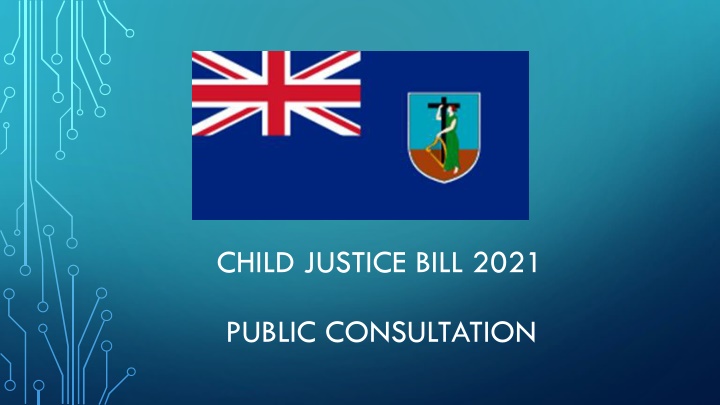

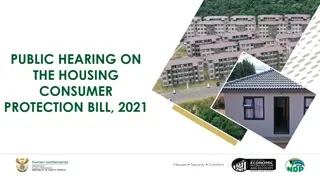

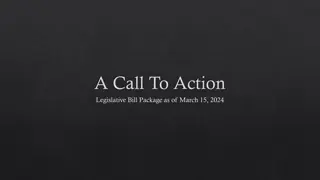

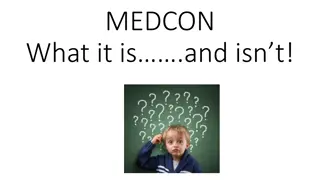
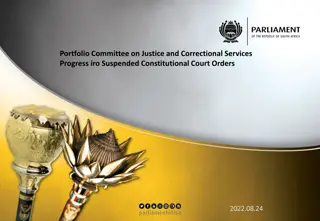
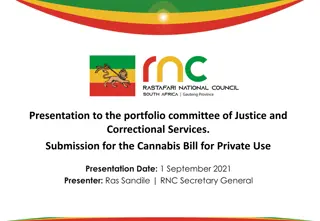


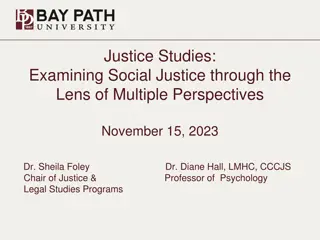

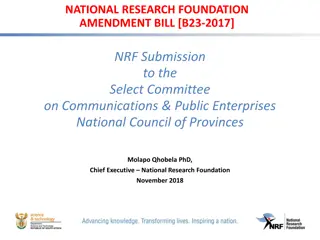

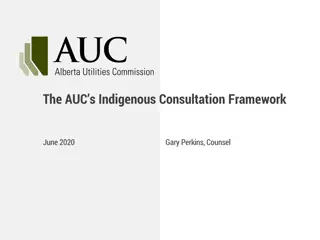
![Briefing on the Criminal Procedure Amendment Bill [B12-2021] to the Portfolio Committee on Justice and Correctional Services](/thumb/157093/briefing-on-the-criminal-procedure-amendment-bill-b12-2021-to-the-portfolio-committee-on-justice-and-correctional-services.jpg)
